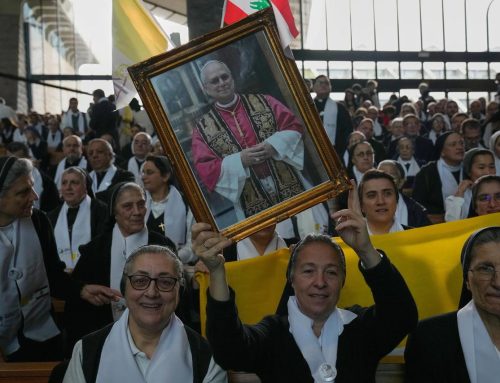
Armenian Archbishop Vicken Aykazian, the Director of Ecumenical Affairs for Armenian Orthodox Church in America Father Mark Arey, the Director of the Office of Ecumenical Affairs for the Greek Orthodox Archdiocese of America, believe time is running out for both Israelis and Palestinians.
The loose umbrella of the US National Interreligious Leadership Initiative (NILI) for Peace in the Middle East , which includes Theodore Cardinal McCarrick, Archbishop Emeritus of Washington, Imam Mohammed Magid, President, Islamic Society of North America, and Rabbi Peter Knobel, Past President, Central Conference of American Rabbis, warns that the possibility of a two-state solution to the Israeli-Palestinian conflict was waning, and urged “immediate, sustained U.S. leadership before darkness falls on the hopes for a peaceful resolution.”
Among the other leaders are Kathryn Mary Lohre, President, National Council of Churches of Christ (USA) and Richard Stearns, President, World Vision US.
Aykazian was in Jerusalem last week to participate in the elections for a new Armenian patriarch and had been one of the contenders for the position, and had he won, his voice would have carried further: the Armenian Patriarchate of Jerusalem is one of the three Guardians of the Christian sanctuaries in the Holy Land. The other two are the Greek Orthodox Patriarchate and the Catholic (Franciscan) Custodia.
The group believes the most viable solution to the Arab-Israeli conflict is a two-state agreement that provides for a secure and recognized Israel living in peace alongside a viable and independent Palestinian state.
“With the support of the international community, Israelis and Palestinians can achieve a lasting peace. A new dawn is possible,” they said in a statement they released.
Mourning the lives lost and shattered during the recent violence that gripped the region, the group warned that what had been seen, over the past years, “will keep happening if movement towards a viable two state-solution continues to stagnate.”
As things stand now, “the status quo is unsustainable and dangerous to both Israelis and Palestinians,” they conceded, but stressed now is not the time for “another cycle of recriminations. It is time to break the cycle of violence with bold initiatives for peace.”
“The current dangerous stalemate, including the legacy of past failed peacemaking efforts, undermines our security and that of others, destabilizes the region, fuels terrorism and extremism, allows continuing Israeli settlement expansion, and prolongs Palestinian disunity. These realities and the absence of negotiations threaten to kill the prospect of a viable two-state peace agreement, the only realistic solution to the conflict,” they said.
They urged strong and determined action, proposing a peace of the brave, because as people of faith, “we proclaim that we should never underestimate what is possible.”
“We know the challenges are daunting, but we believe a bold new initiative for an Israeli-Palestinian peace settlement should be an immediate priority of the new They noted that the US “has unique leverage and credibility in the region” and that no past progress towards peace has occurred in the Arab-Israeli conflict without U.S. leadership, facilitation or staunch support. “Once again, we need active, fair and firm U.S. leadership to help break the current deadlock and to achieve a two-state peace agreement now before it is too late,” they added. They pledged to mobilize the strong support that exists in churches, synagogues and mosques across the US, in the push for peace. By Arthur Hagopian





